September 2015
|
| |
|
Baptism & Preaching
What does your baptism mean to you? Do you know when and
where you were baptized? Do you regularly thank God for
your baptism? Do you renew your baptismal vows every
year at the Easter Vigil liturgy?
Martin Luther held on to his baptism. In the
Large Catechism
(1529) he famously taught that “faith must have
something… to which it may cling and upon which it may
stand. Thus faith clings to the water and believes it to
be Baptism in which there is sheer salvation and life” (The
Book of Concord,
p. 440). Believing in Jesus is too little since we don’t
have his hand to hold, nor his shoulder to lean on. But
with baptism we can feel the water, hold on to our
baptismal certificate, and look at the photos.
|
Seven years later, however, Luther preached that
whoever is baptized “no longer needs that sign,
but without ceasing [needs] the Word and
preaching by which faith is awakened,
strengthened, and preserved.” He then goes on to
say that’s “why we also see that Baptism was
committed to much less important people than was
the preaching office. Christ Himself baptized no
one, but committed that to His disciples (John
4:2). Saint Paul say that he was not sent to
baptize, but to preach the Gospel, and that he
himself had baptized few people, even though he
had preached the Gospel among almost all the
Gentiles (1 Corinthians 1:17, 14)” (Luther’s
Works
77:286). So hold on to your baptism―for sure,
but perk up all the more when the Word is
preached with “purity and refinement” (LW
41:219).
Pastor Marshall
|
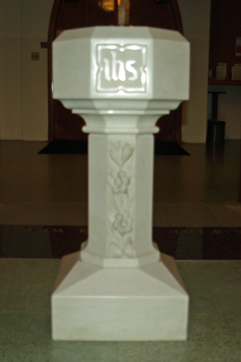 |
|
|
| |
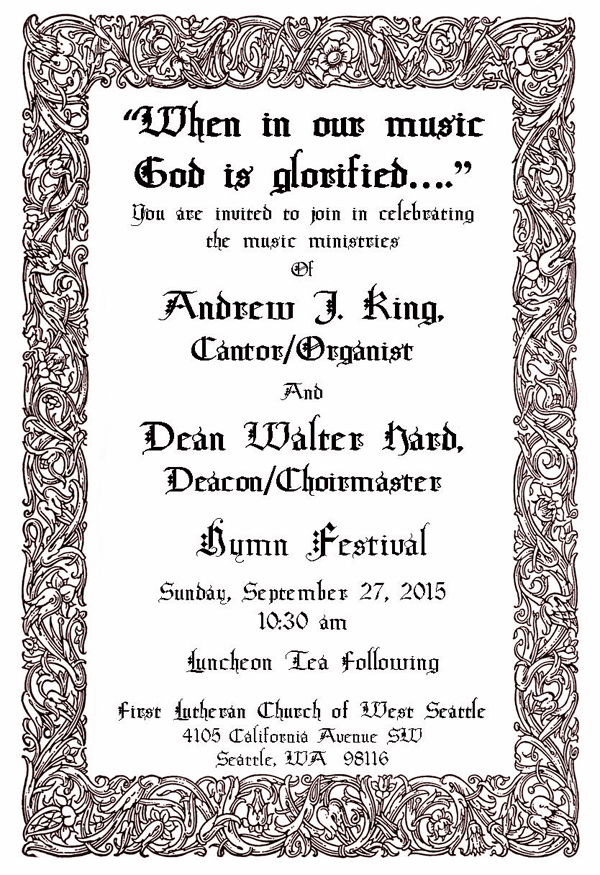
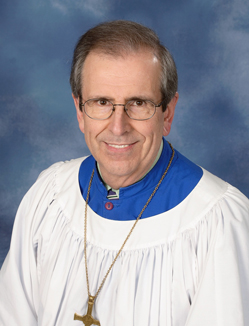 |
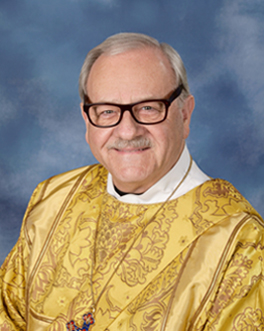 |
|
“WHEN IN OUR MUSIC GOD IS GLORIFIED…”
So
begins the opening hymn for the 10:30 am liturgy on
September 27, 2015
celebrating the music ministries of
Andrew J. King,
Cantor/ Organist, and
Dean
Walter Hard, Deacon/Choirmaster.
They have served First Lutheran Church of West
Seattle for over 40 years, tirelessly planning,
teaching, and providing music for worship that reflects
excellence, variety, and is in keeping with our
liturgical Lutheran heritage.
The 10:30 am only service will be a
hymn festival
focused around the lessons and liturgy of the 18th
Sunday after Pentecost.
Included will be hymns and arrangements by Carl
Schalk, John Ferguson, of St. Olaf College, as well as
a specially
commissioned anthem on Psalm 42 by local organist
and composer, David Dahl, University Organist Emeritus
of Pacific Lutheran University.
Following the service, a luncheon tea will be
held in the parish hall.
Mark
your calendar and plan to attend.
Come and be part of honoring Andy and Dean, who
have enhanced our worship and given so much to our
parish.
X
X
X
|
|
| |
PRESIDENT'S REPORT....by
Earl Nelson
According to Luther’s (prophetic) insight into the
meaning of Holy Scripture we are saved not by works but
by faith alone.
At First Lutheran Church of West Seattle we know
that this does not mean that works are not
required.
Rather, we accept, as did Luther, James’ dictum that
faith without works is dead.
To be in such a position alienates us from the
culture today as it alienated the first Christians from
the culture of their day.
Human culture always conditions us to seek
fulfillment through our own powers and means and to be
rewarded for our efforts.
To accept the gift of salvation as it is offered
to us in Christ crucified requires that we first be
utterly humiliated in ourselves.
Such are the terms under which it is offered.
Sin means that we are at fault, cannot amend our
fault, and do not deserve to be forgiven.
That all this should be true, and yet we should
be forgiven, is not believable on human terms according
to the dictates of human reason about such matters.
If sin is as bad as what I just described, then
why should God forgive us?
To say nothing of what must happen in order for
God to forgive us: that God should require the sacrifice
by torture of the only innocent human being ever to have
lived!
Indeed we must give up ourselves entirely to believe
that God forgives us.
“The kingdom
of heaven is like a merchant in search of fine pearls,
who, on finding one pearl of great value, went and sold
all that he had and bought it.”
(Matthew 13: 45)
On the surface this parable might seem to suggest
that salvation is a rational transaction: the merchant
recognizes the pearl of greatest value and makes a
rational decision to buy it.
Heaven is a good deal.
If this were so, then why are there so few buyers
and why is this even considered a parable?
I suspect the challenge of this deceptively
simple parable lies in two elements, selling all you
have, and recognizing the pearl of great worth.
When a merchant makes a purely rational decision
is he giving up all that he has, or is he actually
relying on, and taking with him, what he essentially is,
a clever buyer, the very thing that made him a
successful merchant in the first place?
Secondly, what does it take to recognize the
pearl of great worth?
If it is really worth more than all that the
merchant has, then the merchant must be deciding that
all he has worked so hard to acquire is actually
worthless compared to the pearl.
This little parable turns out to be about dying
to oneself, for the merchant will have to give up not
just all that he has but all that he has been up
to this point.
But how exactly does one “die to oneself?”
How is that something one decides to do?
It is not an ordinary decision, if that is even
the right word for it.
Accepting the gift of salvation through Christ
apparently requires humiliation.
I am distinguishing here between humiliation as
something that happens to you, and being humble, as
something one voluntarily does.
People can try to be humble by their own effort,
and sometimes make a good show of it.
But what I am talking about is something that
happens to you, like the humiliation of Peter.
I do not think that
|
|
people who have been truly humiliated are likely to make
a show of humility.
Christ told Peter he would deny Christ three
times before the cock crowed.
Peter said no, he would not.
Peter as we know then denied Christ three times.
Quite a story to have set down for all
(historical) time about yourself if you are going to be
the rock on which Christ will found his church!
But that was not enough.
Peter was reprimanded three times in the presence
of the other disciples when the risen Christ asked him
three times, “Do you love me?”
I think this was humiliation, and I think it has
to do with the nature of faith, and with the rock, or
foundation of the church of Christ.
The first part of a Lutheran sermon is “arguere peccatum”
or to convict the listener of his sin.
Being convicted of one’s sinful nature, and the
hopelessness of sin, is needed to “sell all that one
owns,” which alone can allow us to accept the unearned,
unmerited, divine gift of salvation.
I think there is a connection between discovering
that you love Christ in the stories of his life, and
then seeing him crucified for you, just as Peter did.
If I come to love and trust Christ in his life, I
must find utter humiliation in his death on the Cross
for me.
Christ humiliates me from the Cross.
The strange thing about it is, unlike the human
social humiliation that we inflict on one another, of
which execution is the most extreme form, in this
humiliation a door opens to a new and eternal life: the
pearl of great worth.
I glimpse it as in a poor mirror, as Paul puts
it, and suddenly the calculus of the merchant in the
parable makes sense.
|
 |
|
| |
|
Stewardship
---------------------------------------------------------------------------------------
Our Synonym for Giving
“Stewardship” seems to be used as a “theologically
correct” synonym for “giving”, and often with the
connotation of “giving more.” But with limited
resources, it may seem there isn’t more to give.
It seems to me that a biblical notion of stewardship is
rather about taking care of what I have charge of so
that I have more with which to make thank offerings to
God and more to share with my neighbors in need.
Well, of what might I be a better steward? Previously I
wrote about how running tap water, hot and cold even, is
an example of how wealthy I am in the context of the
rest of the world. Water is a precious commodity,
especially given the drought condition in the western
U.S. and our destructive and deadly wildfires. Now being
good stewards of water is an ever more pressing concern.
Am I a good steward of water? No. I waste a lot of
water, water that others could drink or otherwise use.
Running water is constantly going down the drain:
rinsing dishes, washing fruit, vegetables, my hands,
brushing my teeth, etc. So much water just going down
the drain. What a waste. Such poor Stewardship. So many
people and so much vegetation dying from lack of water.
And I’m allowing it to run down the drain.
Now I’m trying to run the water less, and with less
pressure, and collect rinse water and carry it out to
the yard for thirsty vegetation. I have “waste” water
that doesn’t really have to be wasted. Better
Stewardship of that water is to use less of it and reuse
more of it. The more water I save, the less the water
bill.
There are other resources like water: electricity, gas,
paper, clothing, etc. The less I use, the more there is
for others. And the less my bills, the more money I have
for the needs of others.
I am one of the wealthy ones of this world, and I have
been too wasteful. I have not been as good a steward of
God’s blessings as I should be. I need to ask for God’s
forgiveness, and change my wasteful ways. Wanting to
have more for others pushes me to practice better
Stewardship.
Bob Baker, Church Council
Stewardship
Budget
Received
Month (July)
$18,026
$20,744
Year to date (Jan-July)
$143,473
$140,895
|
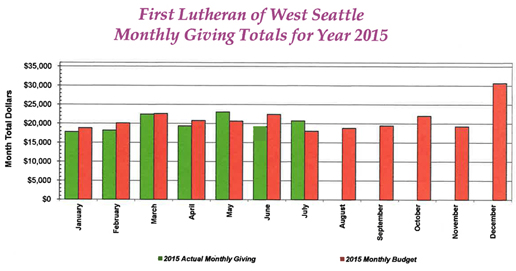 |
|
| |
|
ANNOUNCEMENTS:
REMINDER:
Only one service on Sunday, September 27th, at
10:30 am.
DEO GLORIA CANTORES
– Choir will start their practice sessions at 7:30 pm on
Thursday, September 17th, in the gallery.
Fall Schedule
starts on Sunday, September 13th.
Adult Bible Class, rm. D and Sunday School, rm.
4, 9:00 am.
Confirmation (6th – 8th grades) meet in the library. The
Wednesday pastor’s classes (10:00 am & 7:30 pm in rm.
D), and confirmation (3:30 pm in rm. D) start on
September 9th.
FOOD BANK DONATION
suggestion for September is canned, boxed or instant
soup.
|

|
Our Sincere Appreciation
On Saturday, June 20th, Gina Allen, Janine Douglass,
Kari Ceaicovschi, Bridget Sagmoen, Valerie Schorn
and Kathleen Hynes volunteered their mornings to
cleaning the kitchen.
Our thanks to them and Pastor Marshall for
assuring that the kitchen was fresh and ready for
another year’s use.
|
Many
Thanks
▬
In July,
Fifty-five
raffle tickets were sold through FLCWS
for the W. S.
Food Bank!
Thank you to those who donated in this way.
So far this year 800 tickets have been sold
and $4,000 raised. The
drawing will be in mid-September.
This
annual raffle for two Alaska Airlines passenger
tickets is a solid reminder of the community support
here in West Seattle.

|
|
| |

|
| |
Dealing With Job
By Pastor Marshall
“My unforgettable benefactor, tormented Job!.... If I
did not have Job!.... Read him, read him again and
again…. Each word remains new to me…. I hasten to it
with indescribable impatience…. More swiftly than the
sounding-line sinker seeks the bottom of the sea,… does
my soul glide therein and remain there” So writes Søren
Kierkegaard in 1843 of his deep admiration for Job (KW
6:198, 204, 205). But the Pulitzer Prize winning
playwright, Arthur Miller (1915–2005), sizes up Job
differently: “Job is the only play in the Bible, and its
most contemporary chapter. If it were ever taken
seriously, half the church-going in the United States
would grind to a stop. Job assures you that if after a
lifetime of decent acts and goodwill toward others you
lose everything you possess for absolutely no
discernible reason, you have no cause to complain. Job
says you’ve got to believe, not only without reward in
this life but with the most severe punishment. Job is
the perfect message for the concentration camps, it is
purest God-contemplation, love without reciprocation. It
is religion without magic, without its open or implicit
attempts to bribe God. Job is a church-closer. But would
the world be better off without Job, that thinnest
possible thread to the stars?” [Arthur Miller,
Timebends: A Life
(1987, 1995) p. xv]. So where do you stand―with
Kierkegaard, Miller or maybe with both in some manner,
shape or form?
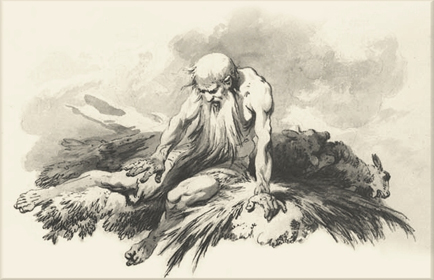
|
|
| |
|
The Original Chalice
-------------------------------------------------------------------------------------------------------
Professor Danto on Holy Communion
“Of the four vessels today claimed to be the Holy
Grail,… the one that most persuades me that it might be
genuine is an ordinary-looking vessel, drably colored,
rather like an individual salad bowl, in a vitrine in
the cathedral of Valencia in Spain. It really looks like
something Jesus could have used at the table, given that
he affected the life of the simple persons he lived
among―carpenters and fishermen and the like [Luther’s
‘uncouth bumpkins,’ LW 22:189]. Of course, as
befits so venerated an object, the Sacra Cáliz,
as it is called, is supported by an ornate and gilded
stand embellished with pearls and emeralds, but if one
saw it by itself, it would be unprepossessingly plain,
though it is carved out of a piece of stone. The Grail
would not have been on so ornate and precious a stand at
the Last Supper itself, where it was actually used for
whatever was eaten on that tremendous occasion, touched
with the lips or the fingers of who those present were
certain was the Messiah. Jesus himself was like that
bowl, if indeed the claim is true that he was God in
human form. Imagine that there was a man just his age in
Jerusalem, who looked enough like Jesus that
|
the two were often confused for one another,
even by those who knew them well. The difference
could not have been more momentous than
that!.... It is felt that the Grail must
have extraordinary powers, given the belief that
it was touched by God incarnate, but the history
ascribed to the Grail, if it really still
exists, has left no traces on its surfaces. That
is was touched by Christ’s lips, that it held
Christ’s blood, cannot be deduced from anything
the eye now sees. Its plainness alone testifies
to the possibility that it was present at the
last meal Christ shared with his disciples,
where it looked like an ordinary dish, maybe a
little special given the special character of he
who used it. But the test for whether Jesus was
God embodied is not part of the forensic
repertoire. The Transfiguration described in the
Synoptic Gospels was intended to show selected
disciples that Jesus transcended the merely
human, for example, by his radiance. But the
so-called Messianic Secret was meant to be kept
quiet―Jesus preferred not to be trooped after by
groupies thirsting for miracles [Matthew 9:30].
For anyone other than witnesses to the
Transfiguration [Matthew 17:2], Jesus was out
and out human [Matthew 13:55].”
|
 |
[Arthur C. Danto, Andy Warhol (Yale
University Press, 2009) pp. 136–39]
|
Hebrews 12.5
Monthly Home Bible Study, September 2015, Number 271
The Reverend Ronald F. Marshall
Along with our other regular study of Scripture, let us
join as a congregation in this home study. We will
study alone
then talk informally about the assigned verses together
as we have opportunity. In this way we can "gather
together
around the Word" even though physically we will not be
getting together (Acts 13.44). (This study uses the RSV
translation.)
We need to support each other in this difficult project.
In 1851 Kierkegaard wrote that the Bible is "an
extremely dangerous book.... [because] it is an
imperious book... – it takes the whole man and may
suddenly and radically change... life on a prodigious
scale" (For
Self-Examination). And in 1967 Thomas Merton wrote
that "we all instinctively know that it is dangerous to
become involved in the Bible" (Opening
the Bible). Indeed this word "kills" us (Hosea 6.5)
because we are "a rebellious people" (Isaiah 30.9)! As
Lutherans, however, we are still to "abide in the womb
of the Word" (Luther's
Works 17.93) by constantly "ruminating on the Word"
(LW 30.219) so that we may "become like the Word" (LW
29.155) by thinking "in the way Scripture does" (LW
25.261). Before you study, then, pray: "Blessed Lord,
who caused all holy Scriptures to be written for our
learning: Grant us so to hear them, read, mark, learn,
and inwardly digest them, that we may embrace and ever
hold fast the blessed hope of everlasting life, which
you have given us in Our Savior Jesus Christ. Amen"
(quoted in R. F. Marshall,
Making A New World: How Lutherans Read the Bible, 2003, p. 12). And
don’t give up, for as Luther said, we “have in Scripture
enough to study for all eternity” (LW
75:422)!
Week I. Read Hebrews 12.5 noting the word punish. How does God
punish us? On this read Ezekiel 14.21 noting the words
sword, famine, evil beasts
and pestilence. Read also Luke 13.4 noting the
words tower and fell. Are there then no
accidents and simple acts of nature? On this read
Matthew 10.29 noting the line not one sparrow will
fall to the ground without your Father’s will. What
does this mean? On this read James 4.15 noting the line
if the Lord wills, we shall live and we shall do this
or that. What is implied by believing that nothing
happens without God’s permission? On this read Job 1.21
noting the words gave, taken and
blessed. What is it like to bless God and praise him
for what he takes away? On this read Hebrews 12.6 noting
the words disciplines and loves. How does
discipline and punishment show God’s love for us? On
this read Romans 1.22-25 noting the line God gave
them up in the lust of their hearts to impurity.
This is God’s wrath (Romans 1.18). But God’s love
punishes us to keep us from going down the path of
impurity. Do you agree?
Week II. Read again Hebrews 12.5 noting the same word punish. How do
God’s punishments keep us from going down the path of
impurity? On this read Amos 4.6-11 noting the five
occurrences of the word yet. In this case the
punishments don’t block further corruption. For an
opposite view, read Judges 6.1-6 noting the words
very, low, cried and help. What
was the difference between the two cases? Is it
severity? On this read Exodus 12.28-33 noting the words
great, cry, urgent and dead.
Note that this is the tenth of the plagues hurled
against Egypt to get Pharaoh to release the Israelite
slaves. For another view read Job 1.22-3.1 noting the
shift from 1.22 to 3.1. What causes this? At 2.10 he is
still abiding with God in spite of his suffering. But
after this silent shock of his friends in 2.13 registers
with Job, then he curses in the next verse. Was it then
the bleak reaction of his friends that pushed him over
the edge? For an opposite view read Hebrews 10.23-25
noting the words stir and encouraging.
Without this help, matters become too severe? Is that
why sin has to become sinful beyond measure
in Romans 7.13 in order to change us? Note as well the
curbs placed on repenting in 2 Corinthians 7.10.
Week III. Reread Hebrews 12.5 noting the same word punish. How are we
to avoid being punished? On this read Luke 13.5 noting
the words unless, repent and perish.
How does repentance save us from harm? On this read 1
John 1.8-10 noting the words deceive, confess,
just, liar and word. How does
confession and repentance trade on truth? On this read
Job 10.7 and 42.3-6 noting the shift from innocence
to self-loathing. Furthermore read 1 John 3.20
noting how God is greater than our condemning
hearts. Read also Hosea 11.8-9 noting God’s extreme
resolve to have compassion. Are these two matters
– self-loathing and extreme divine compassion – the
truth that repentance brings to set us free in
John 8.32 and to be witnessed to in John 19.37?
If so, then repentance is powerful indeed. It sets
matters straight. It is the brokenness and contrition in
Psalm 51.17.
Week IV. Read Hebrews 12.5 one last time noting again the word punish.
So if we fail to repent and are punished after all, how
should we deal with it? On this read Hebrews 12.4 noting
the words yet and blood. This shows that
things could always be worse. So we mustn’t complain
when punished, but instead thank God for his leniency.
Next read Matthew 26.75 noting the phrase wept
bitterly. This shows that we shouldn’t make excuses
to defend ourselves when caught in the act and punished,
but instead concede to the Almighty that he is right to
castigate us and we are wrong for sinning. Finally read
Romans 5.3 noting the word rejoice. This shows
that we are to transcend the pain of the moment when
punished to rejoice in God’s correction and
strengthening of us through that very punishment. Can
you handle that? If not go to Matthew 11.28-30 for the
interplay between burden and rest.
|
|
| |
|
Sunday Education
with Pastor Marshall
2015-2016
9:00 to 10:00 am, Room D
FALL SESSION
I,
September 13 - October 25
Luther’s
Wife: The Mother of the Reformation
This eight week class will study the new
translation by Mark E. DeGarmeaux of Ernest Kroker’s
1906 book, The Mother of the Reformation: The Amazing
Life and Story of Katherine Luther (2013). Copies of
the book are available for $15 each.
This class
is the eleventh in our series of studies on the
Reformation, leading up to its 500th anniversary in
2017. This series began in April 2009.
FALL
SESSION II,
November 1 - December 20
Working
Out Your Salvation: A Study of Philippians
In this eight week class we will study Saint
Paul’s Letter to the Philippians. Our theme verse will
be the one on working out your salvation in fear and
trembling because God is at work in you (2:12-13).
Before
each class session, a worksheet will be handed out for
the next class with selected verses to concentrate on in
preparation for the coming class.
WINTER
SESSION,
January 3 - 31
Being
Governed – Luther on Secular Rulers
In this short, four week class, we will study a
brief section from Luther’s sermons on First Peter from
1523 having to do with secular government (LW
30:72-81.
This class
is the twelfth in our series of studies on the
Reformation, leading up to its 500th anniversary in
2017.
SPRING
SESSION I,
February 7 – March 27
The
Octonary Psalm: A Study of Psalm 119 on God and His Word
In this eight week class we will study Psalm 119.
This long psalm is usually divided up into eight verse
sections and for that reason is known as the octonary
psalm. This psalm stresses the connection between God
and his word – which, according to Luther, is the only
way we have for getting beyond God’s unknowability (LW
3:138).
Each class
session will be based on a worksheet of questions handed
out the week before.
SPRING
SESSION II,
April 3- May 22
Countering
Islam: Luther’s 1542 Critique
This eight week class will study Luther’s preface
to his translation of Riccoldo da Monte di Croce’s
Refutation of the Koran (1301). Luther’s Works
60:253–266.
This class
is the thirteenth in our series on studies in the
Reformation, leading up to the 500th anniversary in
2017.

|
|
Schedule for
Wednesday Bible Classes
with Pastor Marshall
2015-2016
Morning 10- 11:30 am
Fall: Matthew
Spring: Exodus
1)
Matthew 1.1-2.23
9)
Matthew 14.1-15.39
1) Exodus
1.1-3.22
9) Exodus 21.1-22.31
2)
Matthew 3.1-4.25
10) Matthew 16.1-1428
2) Exodus
4.1-5.23
10) Exodus 23.1-24.18
3) Matthew 5.1-48
11) Matthew 18.1-19.30
3) Exodus
6.1-8.32
11) Exodus 25.1-26.37
4) Matthew
6.1-7.29
13) Matthew 20.1-21.46
4) Exodus
9.1-11.10
12) Exodus 27.1-29.46
5) Matthew
8.1-9.38
13) Matthew 22.1-23.39
5) Exodus
12.1-13.22
13) Exodus 30.1-32.35
6) Matthew
10.1-42
14) Matthew 24.1-25.46
6) Exodus
14.1-15.27
14) Exodus 33.1-35.35
7) Matthew
11.1-12.50
15) Matthew 26.1-75
7) Exodus
16.1-17.16
15) Exodus 36.1-38.31
8) Matthew
13.1-58
16) Matthew 27.1-28.20
8) Exodus
18.1-20.26
16) Exodus 39.1-40.38
Evening 7:30 - 9:00 pm
Fall: Deuteronomy
Spring: 1 John
1)
Deuteronomy 1.1-2.37
9)
Deuteronomy 18.1-20.20
1) 1 John
1.1-4
9)
1 John 3.16-24
2) Deuteronomy
3.1-4.49
10) Deuteronomy 21.1-22.30
2) 1 John
1.5-10
10) 1 John 4.1-12
3) Deuteronomy
5.1-6.25
11) Deuteronomy 23.1-25.19
3) 1 John
2.1-6
11) 1 John 4.13-21
4) Deuteronomy
7.1-9.29
12) Deuteronomy 26.1-27.26
4) 1 John
2.7-14
12) 1 John 5.1-5
5) Deuteronomy
10.1-11.32
13) Deuteronomy 28.1-29.29
5) 1 John
2.15-20
13) 1 John 5.6-12
6) Deuteronomy
12.1-13.1
14) Deuteronomy 30.1-31.30
6) 1 John
2.21-29
14) 1 John 5.13-21
7) Deuteronomy
14.1-15.23
15) Deuteronomy 32.1-52
7) 1 John
3.1-8
15) 2 John 1.1-3
8) Deuteronomy
16.1-17.20
16) Deuteronomy 33.1-34.12
8) 1 John
3.9-15
16) 3 John 1.1-15
.png)
|
With the Mind
---------------------------------------------------------------------------------------------------------------------------
Readings
in Contemporary Theology with Pastor Marshall
in the Church Lounge, 3-5 pm, the fourth Saturday of
each month.
2015-2016
Sept. 26
Billy Graham,
Nearing Home: Life, Faith, and Finishing Well
(2011).
Oct. 24
Brian Moore,
Catholics: A Novel (1972, 2006).
Nov. 28
Jeremy Treat,
The Crucified King: Atonement and Kingdom in Biblical
and
Systematic Theology
(2014).
Dec. 26
Tullian
Tchividjian, Unfashionable: Making a Difference in
the World by Being
Different (2009, 2012).
Jan. 23
Philip Jenkins,
Jesus Wars: How Four Patriarchs, Three Queens, and Two
Emperors
Decided What Christians
Would Believe for the Next 1,500 Years (2011).
Feb. 27
Alvin Plantinga,
Knowledge & Christian Belief (2015).
Mar. 26
Billy Graham,
Storm Warning: Whether Global Recession, Terrorist
Threats, or
Devastating Natural
Disasters, These Ominous Shadows Must Bring Us Back
to the Gospel
(1992, 2011).
Apr. 23
Pope Francis,
Praised Be You: On Care for Our Common Home (2015).
May 28
Eric Metaxas,
Miracles: What They Are, Why They Happen, and How They
Can
Change Your Life (2014).

September Book
---------------------------------------------------------------------------------------
3-5 pm in the Church Lounge, Saturday, September 26th.
The book
for September is Nearing Home: Life, Faith, and
Finishing Well (2011), by Billy Graham (b. 1918),
the most famous Christian evangelist in American
history. Well into his nineties, Graham addresses in his
book the questions we face as we grow older: “[What is
God’s] purpose for these [extra] years [Psalm 90:10],
and how can we align our lives with it? How can we not
only learn how to cope with the fears and struggles and
growing limitations we face but also actually grow
stronger inwardly in the midst of these difficulties?
How can we face the future with hope instead of
despair?” (p. viii).
|
How can we face the future with hope instead of
despair?” (p. viii).
A
copy of this award winning book on life and
death is in the church library. If you would
like to purchase one for yourself, contact
Pastor Marshall. Feel free to attend our meeting
when we discuss Graham’s answers to the
questions he poses on growing old. |
 |
|
|
| |
Saint Nicholas Faire
Sunday, December 6, 2015 from 4 to 7 pm
We’re at it again.
Thank you to all who have already begun helping
prepare for this annual fund raising event.
So many of you have stepped up to the plate, or
in this case the “Christmas in July and August tree,”
and taken ornaments.
Many of you have already made your
purchases/donations and they have been catalogued and
are waiting to be made into baskets for purchasing at
the Faire.
At this writing, there are still some ornaments left on
the “Christmas in July and August tree”….. so if you can
purchase additional items for gift baskets please give
me a call and I can let you know what we still need
(Larraine at 206-937-6740).
If you would prefer, you can donate money
designated to the St. Nicholas Faire and we will do the
shopping.
Plus, in late November, we will be purchasing items that
need to be fresh, so they need to be bought closer to
the date of the Faire.
If you would like to help in this way, please let
me know and I can give you a list of items to choose
from.
But most important, always remember that all our efforts
are to support, in a fun and enjoyable way, two very
important extended ministries – the West Seattle Food
Bank and the West Seattle Helpline.
We are looking forward to having a super evening
of wine tasting, a new twist on the wine toss game (for
prizes!), munchies, conversation and fellowship, and
“shopping” for Christmas gifts for friends and family.
Where else can you go so close to home to such a
party. And
it all benefits two great organizations!
So plan to come and invite your neighbors and
family and friends to come with you.
|
 |
Sign-up
sheets for helpers for the event will be posted in
October and more details about the event will appear in
future Messengers
and bulletin announcements.
So,
MARK YOUR
CALENDARS!!!!
If
you don’t come there will be no party, no fun, and no
funds raised for the West Seattle Food Bank and
Helpline.
─Larraine King
|
|
| |
|
X
PARISH PRAYERS
X
Remember in prayer before
God those whom He has made your
brothers and sisters
through baptism.
Dorothy Ryder, Florence Jenkins, Kyra Stromberg, Anelma
Meeks, Bob Baker, Michael & Eileen Nestoss, Mary
Goplerud, Cynthia Natiello, Leah Baker, Peggy & Bill
Wright, Bob & Barbara Schorn, Cameron Lim, Ion
Ceaicovschi, Luke Bowen, Tabitha Anderson, The PLU
Faculty, Christine Marshall, Ron & Margaret Douglass,
Donna Mullin, Tina Bagby, Calvin Diekhans, Tyler Arkles,
Marjorie and Cortney.
Pray for the shut-ins that the light of Christ may give
them joy:
Donna Apman, Pat Hansen, C. J. Christian, Louis Koser,
Anelma Meeks, Dorothy Ryder, Lillian Schneider, Crystal
Tudor, Nora Vanhala, Vivian Wheeler, Peggy & Bill
Wright.
Pray
for the newly confirmed members that God may inspire
their discipleship: Pray for Sam Allen, son of Tim and
Gina Allen.
Pray for those who have suffered the death of a loved
one this Summer: Pray that God will bear their grief and
lift their hearts: Pray for Sonja Clemente and family on
the death of Clara Anderson;
mother, grandmother, great and great-great grandmother.
Also pray for the Allen family on the death of Tim’s
brother, Greg Allen; and for Vivian Wheeler and family
on the death of her son David Wheeler.
Pray for our bishops Elizabeth Eaton and Brian Kirby
Unti, our pastor Ronald Marshall, our deacon Dean Hard
and our cantor Andrew King, that they may be
strengthened in faith, love and the holy office to which
they have been called.
Pray that God would give us hearts which find joy in
service and in celebration of Stewardship.
Pray that God would work within you to become a
good steward of your time, your talents and finances.
Pray to strengthen the Stewardship of our
congregation in these same ways.
Pray for the hungry, ignored, abused, and homeless this
September.
Pray for the mercy of God for these people, and for all
in Christ's church to see and help those who are in
distress.
Pray for our sister congregation:
El Camino de Emmaus in the Skagit Valley that God
may bless and strengthen their ministry.
Also, pray for our parish and it's ministry.
Pray that God will bless you through the lives of the
saints:
Saint Matthew, Apostle and Evangelist; and Saint Michael
and All Angels.
|
A Treasury of
Prayers
O
most loving Father, watch over my lips, my
steps, my deeds. Give me love, born of your love
to me, that I may love others as you love me.
Let my heart, frozen in sin, cold to you and
cold to others, be warmed by your divine fire.
In Jesus’ name I pray. Amen.
[For
All the Saints
II:1214-15, altered.]
|
|
|
| |
|


